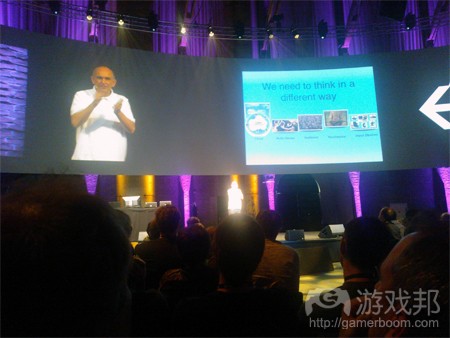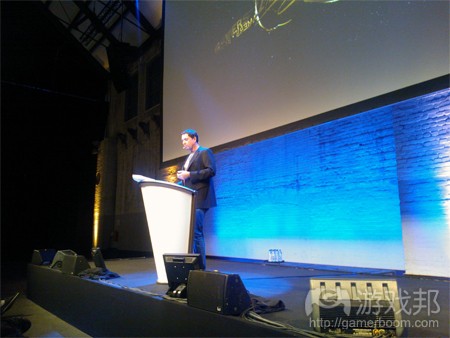总结Unite 2012大会对游戏行业的5个启示
作者: Keith Andrew
在过去几年,Unity已经在北美大陆扎下根基。上一周,Unity年度大会——Unite横渡大西洋抵达欧洲海岸,在阿姆斯特丹进行了三天。
本文作者有幸听闻不少心得体会。以下是印象最为深刻的5件事。
1、我们对移动市场一无所知
目前,移动市场欣欣向荣,开发商常常指望着从这种成功中找到什么可行和什么不可行的答案。
然而,Peter Molyneux却欣然承认,他一无所知。事实上,我们确实太盲目了。
与传统的手机市场相比,智能手机市场和支撑它的数字市场太年轻了,所以,说我们已经掌握了市场的复杂细节,那只是一个谬论。
确实,这种想法很危险,开发商只是在效仿前人的做法,而不是创新;只是依靠已经被证实和测试过的模式,而不是利用新平台、开发新平台的潜能。
找到智能手机行业的边界、支撑该行业的消费力量及其他复杂之处,是Molyneux的22 Cans工作室所关注的。
该工作室将发布自己的游戏试验品,它们可以作为所有新游戏的发展蓝图,即使Molyneux游戏本身并未收获大量盈利。
Molyneux表示:“如果我瞥到什么东西,却无动于衷,眼睁睁地看着别人下手,那我就太可悲了。但如果只有我一个人可以从中获利,那仍然不是理想的状态。
“成为一个不断演变的行业中的一份子,是一种奇妙的感觉,无论我的所做所为是否能为它的发展添砖加瓦。”
2、Unity重视推广甚于利润
在Unity首席执行官David Helgason在演讲时拿着一根小鸡形状的笔,真是滑稽。但令人印象深刻的是,Unity决心携手尽可能多的开发者。
然而,说我天真吧,我不认为他的动机是钱。
不要误解我——作为一家公司,Unity显然以相当稳固的资本为傲。Unite 2012的每一个元素——从我们这些媒体人的膳宿到场地本身,都很上档次。
但与Helgason交谈,你可以感觉到他的失望,因为许多开发者现在独自追求他们的抱负,但如果有了Unity支持,他们本可以更快实现目标。
这是一个值得自豪的事,可能就像引擎的统计数据一样让人惊喜。据估计,目前已经有53%的移动行业开发者投入到这个平台中——不难想象,在以后的时间里,Helgason及其公司将奋力争取更大的份额。
如果Unity继续通过Unite大会这类方式倾听用户群体的心声,那么这也不是坏事。
3、Kickstarter并没有那么重要(游戏邦注:Kickstarter是一个用于项目捐款的大众融资网站,门槛极低)
如果存在与公平竞争有一点儿脱节的说法,那就是inXile的Brian Fargo的两场主题演讲。
演讲本身并没有什么错——的确,Brian的视频详细地解释了为什么他必须借助Kickstarter筹资开发《Wasteland 2》,博得了全场的笑声。
尽管如此,他提出的集体资助平台在以后所起作用的建议,可能与许多人的看法不一。
一言以蔽之,Fargo认为默默无闻的独立开发者现在只能筹集到几十万美元用于开发项目,但将来的下一款游戏能够吸引200万、400万,甚至1000万。
有些工作室不断地在Kickstarter集资,获得巨大成功,然而,要理解它们的想法并不容易。
此时,Kickstarter和Indiegogo主要用于项目集资,而这类项目很大程度上是发行商不感兴趣的。
使用这些网站得到额外的预资助,用于开发已证实成功的游戏,但这看似并非顺利,而且总的来说,这种模式的存在丧失消费者信任的风险。
4、开发商看好Windows Phone 8
在Helgason的主题演讲中,所有媒体都注意到的一件事是,当某种新功能公布时,全场反应热烈。
当公布Unity支持即将发行的Windows Phone 8时,全场爆发了最响亮的“哇”声。
Windows Phone 7可能没有积累到堪比Android或iOS的用户基础,但这个微软平台收到的热情反响暗示着开发商已经接纳了它的继承者——Windows Phone 8。
5、独立开发者不能没有忧患意识
Peter Molyneux 坦言,在Unite上发表专题演讲的前一天晚上,他一夜未眠,并非大家在现场上看到的那么精神。
这是他在聊天时吐露的话。不难理解,为什么甚至在他成功以后,Molyneux还是担忧大家对其离开微软后的首个项目的接受程度。从绝对安稳的大公司转到经常焦虑的独立开发事业,Molyneux有充分的理由感到忧虑。
但怀有这种忧患意识是件好事。
Molyneux认为,自满自得会导致设计灵感的枯竭。事实上,事物随时会变的意识会促使开发者多做实验,从理论上说,这样有助于制作出更好的游戏。
Molyneux解释道:“走出去,一切从头开始,没有支持,没有资本,没有团队,没有桌子,没有电脑,脱离苹果,这是一件疯狂的事。但是,你从人生中获得最丰厚回报的时候,就是在你做最困难的事情的时候。”
“那就是你体验到成就感的时候。”(本文为游戏邦/gamerboom.com编译,拒绝任何不保留版权的转载,如需转载请联系:游戏邦)
Five things we learned from Unite 2012
by Keith Andrew
What’s in a location? Having based itself in North America during the last few years, Unity’s annual conference – better known as Unite – ventured across the Atlantic to European shores last week, setting up shop for three days in Amsterdam.
It’s hard to imagine a better venue, in truth. The Dutch capital is undoubtedly one of the friendliest cities on the planet – a suitable host for an event that prides itself on being all about community.
It’s hard to argue with that angle, too.
For all its bright lights and slick presentation, Unite 2012 had the feeling of a school summer camp throughout: ‘pupils’ voluntarily giving up time to come together and share all they’ve learned over the past 12 months.
PocketGamer.biz was more than happy to soak up a bit of said knowledge itself. Here are the five things that, days on, remain top of mind.
1. We know nothing about mobile
So often developers look to existing successes in the mobile market to serve up all the answers as to what works and what doesn’t.
Peter Molyneux, however, is willing to admit that he knows nothing. In fact, we’re all essentially firing blind.
So new is the smartphone market and the digital marketplaces that supports it in comparison with all that came before that it’s a a fallacy to think we have the ins and outs of it defined.
Indeed, such thinking is dangerous, risking developers merely imitating what’s come before rather than innovating, falling back on what’s believed are tried and tested models rather than taking advantage of these fresh platforms and pushing them for all they’re worth.
Finding out the exact borders of the smartphone industry, the in-app purchases that fuel it, and its other intricacies is what Molyneux’s 22 Cans studio is about.
Molyneux during his keynote
The firm’s experiments – the results of which will be published – could serve as a blueprint for all the games that follow, even if Molyneux’s own titles fail to raise revenue aplenty themselves.
“It would be a sorry state if I glimpsed something, but didn’t act on it and someone else did,” said Molyneux, “but it would also be a sorry state if only I could use it.
“It’s a fantastic feeling to be part of an industry that evolves and changes, whether that in a tiny way inspired by something I’ve done or not.”
2. Unity’s expansion a matter of pride, not profit
Having sat down with Unity CEO David Helgason shortly after his keynote speech – bizarrely by a chicken pen – the overriding impression I got was this is a made determined to get Unity in the hands of as many developers as possible.
However, call me na?ve, but I don’t believe his motivation is money.
Don’t get me wrong – as a company, Unity clearly boasts a rather healthy bank balance. Every element of Unite 2012 – from the accommodation for us press packers to the venue itself – smacked of class.
But talking with Helgason, you can feel the frustration that many developers are currently going their own way to hit highs that they could reach in far less time with Unity behind them.
This is a matter of pride, and as impressive as the engine’s stats may be already – an estimated 53 percent of all mobile devs having plugged into the platform to date – it’s not hard to imagine Helgason and co. pushing for a greater and greater share in the years ahead.
If Unity continues to listen to its community via the likes of Unite, however, then that may be no bad thing.
3. Kickstarter shouldn’t be the be all and end all
If there was one talk that felt slightly out of touch with the fair play that otherwise purveyed throughout, it was day two’s keynote by inXile’s Brian Fargo.
There was nothing wrong with the talk itself – indeed, Brian’s video detailing why he’d had to take to Kickstarter to fund the development of Wasteland 2 drew plenty of laughs.
Nonetheless, the suggestion as to the role he sees such crowd funding platforms playing in the future may not have sat well with many.
Fargo on day two
It was all summed up in one line, where Fargo suggested that unknown indies currently only able to raise a few hundred thousands for their titles now may in the future be able to pull in $2 million for their next game, $4 million the game after that, and $10 million the game after that.
The idea of studios that have amassed such hits taking to platforms such as Kickstarter time after time, however, is not an easy one to digest.
At the moment, Kickstarter and Indiegogo are primarily used for projects that, by and large, publishers aren’t interested in.
To start using them almost my default to generate an extra layer of pre-funding for games that are proven hits, however, seems less palatable, and risks the model as a whole losing consumer credibility.
4. Developers looking to dive in with Windows Phone 8
One thing the entire ensemble of press noticed during Helgason’s keynote speech was the crowd reaction certain new features unveiled during the presentation got from the crowd.
The biggest ‘whoops’ of all came for the unveiling of Unity support for the forthcoming Windows Phone 8.
Windows Phone 7 may not have amassed a userbase capable of taking on either Android or iOS, but the warm reaction afforded Microsoft’s platform suggests developers are already on board with its successor.
5. Fear is an indie dev’s best friend
By his own admission, Peter Molyneux didn’t get any sleep the night before his keynote speech at Unite. Not that you’d have known by his performance.
Such an admission came out during his chat with PocketGamer.biz. Indeed, before I’d even sat down, your humble editor had been quizzed as to exact how I thought his talk had gone down with the audience at large.
It’s not hard to understand why Molyneux, even after all his success, is nervous about the reception his first post Microsoft project is being afforded. Having switched from a position of absolutely security back to the often perilous life of an indie, Molyneux has every right to be a little bit nervy.
But such fears are healthy.
Complacency leads to sterile, static design, Molyneux suggested. The knowledge that things could go wrong at any time actually leaves developers more reason to experiment and, in theory, leads to better games in the long run.
“To go out and start all over again, and not to have backing and not to have a team that is fully funded, not to have desks and computers and relationships with Apple is a mad thing to do, but the time in your life when you get the most out of life itself is when you take on something incredibly hard,” said Molyneux.
“That’s when you get that sense of achievement.”(source:pocketgamer)
上一篇:论述手机游戏领域的交叉推广技巧









































 闽公网安备35020302001549号
闽公网安备35020302001549号